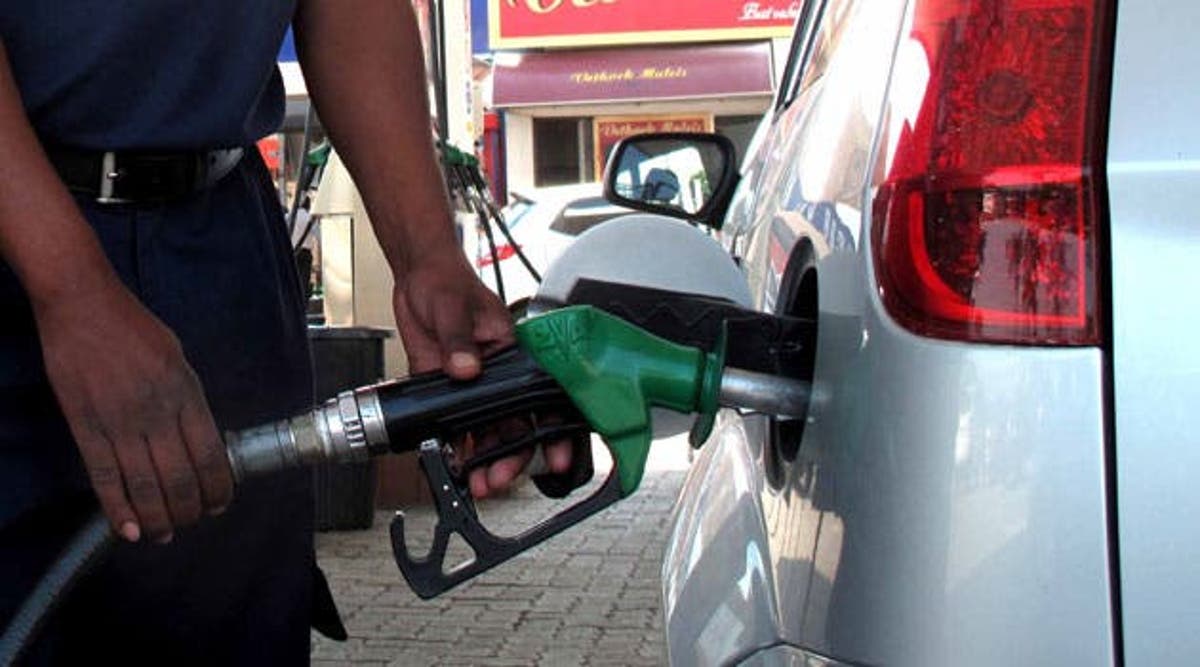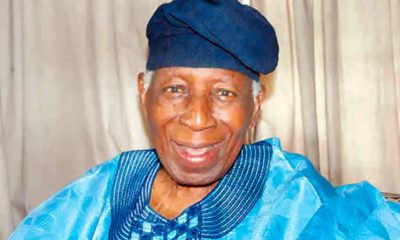Business
FG promises to end fuel queues next week, turns back petrol vessels from Belgium

The Federal Government says the lingering fuel crisis resulting in long queues at filling stations will end next week.
It has also turned back five Nigeria-bound petrol-laden vessels from Belgium where the initial bad fuel was said to have been imported.
Group Managing Director of NNPC Limited, Mele Kyari, disclosed this on Wednesday during a session with House of Representatives Committee on Petroleum Resources (Downstream).
He also said the corporation had filed for damages against the suppliers of the off-spec fuel.
He stressed that the NNPC was doing everything to ensure product availability.
Already, he said that about 2.5 billion litres of PMS were being expected before the end of the month.
Kyari said, “For this current situation, I assure you that we have taken every necessary step to restore supply into this country.
“We have placed orders significant enough for us to cross into March, with at least 2.1 billion litres of PMS in our custody.
“The situation you’re seeing today, I can assure you that by next week, it will vanish, all things being equal.”
On why inspectors did not detect methanol, Kyari said: “It is not part of their requirements at the load port. So, we didn’t ask them to declare whether it contains methanol because it is not part of our specification.
“Let me make it clear that methanol is not contamination. It is a regular additive to PMS. In China, up to 15 per cent of PMS contains methanol.
“On its own, it is not a contamination. The key issue is handling methanol. If we knew, we will not accept this. Anytime methanol comes in contact with water, it emulsifies, it turns into a different chemical.
“We didn’t know until our inspecting agents, on 20th of January to be precise, called our attention to the fact that they had seen emulsification in some of the depots and this may be a cause of concern.
“That was how we went ahead to check all the deliveries in our hands from all the four vessels that had already been discharged to confirm that all of them contain methanol.
“We quarantined all the volumes wherever they were in depots transit and we were able to track them. We were able to trace all of them and quarantine them.
“Not only that. We are also expecting several other supplies to come from other sources.
“We checked their origin and confirmed that five other vessels are coming from the same shipping terminal that loaded this and we rejected all of them; they did not sail into our waters.”
He added: “We did not test for methanol both at the load port and by the NNPC and the regulatory authority. I was very clear on this.
“What they (importers) are saying is that ‘what I brought met your specification.’ But what they probably also did not know is that it contained methanol and that methanol originated from the loading terminal.
“It is a legal issue, but it is nowhere sustainable because we have also filed liquidated damages which they can pass on until it gets to the originating depot.
“The liquidated damages can be a legal process where you may not even be able to recover your possession.”
Kyari reassured Nigerians every necessary step has been taken to ensure supply sufficiency.
“Let me tell Nigerians that we have a robust supply plan. By the end of this month, we’ll have about 2.1 billion litres of PMS.
“What we call panic buying is a situation where people who usually go the filling stations to buy N2,000 worth now buy five times that volume and those with more than one car will bring out all their cars.
“That is why you see all these cars in the filling stations and it creates supply disruption.
“We are assuring Nigerians that we have a robust supply plan and there is no need to bring out all your cars. Just buy what you need because there are plans to address this situation.”
He expressed regret over the economic disruptions and hardship.
“We are very conscious of the consequences that will come with it – the queues that you are seeing, the disruption of the economic activities that are very obvious. We are aware of this.
“We regret this situation and it is completely unavoidable. We didn’t see it coming. I apologise to Nigerians that we didn’t see it coming.”
A member of the Committee, Adedeji Olajide, said NNPC’s ignorance about the PMS containing methanol was not an excuse, adding somebody must be held responsible.
Business
How to use $23bn forex reserves to stablise exchange rate, by Uwaleke

How to use $23bn forex reserves to stablise exchange rate, by Uwaleke
A financial expert, Prof. Uche Uwaleke has said the accretion of Foreign Exchange Reserves (NRER) at 23.11 billion dollars to Nigeria’s external reserves puts the Central Bank of Nigeria (CBN) in a stronger position to defend the value of the naira.
“The CBN can leverage rising external reserves to intervene in the forex market whenever it becomes necessary to stabilise the exchange rate,” Uwaleke said while arguing that the current size of the NER will positively impact on the value of the Naira.
Uwaleke, a Professor of Capital Market at the Nasarawa State University, Keffi, is also the President of the Capital Market Academics of Nigeria, however, raised concerns that the increase in the nation’s foreign reserves had been largely on account of temporary FX inflows such as Foreign Portfolio Investments (FPIs) and foreign loans.
He said that they represented unsustainable sources of growing external reserves.
“Impatient capital such as FPIs carry a lot of risks and have the potential of destabilising the economy whenever they leave the country.
“Against this backdrop, the government should pay more attention to diversifying the export base of the economy, especially via agriculture and solid minerals.
“The government should also create the enabling environment that attracts sustainable Foreign Direct Investments (FDIs) ,” he said.
READ ALSO:
- Heavy gunfire in FCT, police recover stolen cars, suspects arrested
- Residents of Lagos, Enugu face extreme heat, amid power issues
- 18 killed as flood wreaks havoc in parts of US
The CBN recently revealed that the NFER stood at 23.11 billion dollars at the end of 2024, their highest level in three years.
The apex bank said that the development signalled a major improvement in the country’s external financial position.
It said that the NFER, which adjusts gross reserves to account for near-term liabilities such as currency swaps and forward contracts, stood at 3.99 billion dollars at the end of 2023.
According to the CBN Governor, Yemi Cardoso, the improved position was due to substantial reduction in short-term foreign exchange liabilities, notably swaps and forward obligations.
Cardoso cited measures aimed at boosting forex market confidence and reserves, alongside increased non-oil foreign exchange inflows.
“This improvement in our net reserves is not accidental; it is the outcome of deliberate policy choices aimed at rebuilding confidence, reducing vulnerabilities, and laying the foundation for long-term stability.
“We remain focused on sustaining this progress through transparency, discipline, and market-driven reforms,” Cardoso said.
He said that Gross external reserves also climbed to 40.19 billion dollars at the end of 2024, up from 33.22 billion dollars the previous year.
“Reserves declined in the first quarter of 2025 due to seasonal factors and foreign debt interest payments, the CBN anticipates a steady uptick in reserves throughout the second quarter,” Cardoso said.
How to use $23bn forex reserves to stablise exchange rate, by Uwaleke
(NAN)
Business
Fuel prices to fall as global cost of crude drops

Fuel prices to fall as global cost of crude drops
Nigerians are expected to pay less for Premium Motor Spirit, also known as petrol, as the price of Brent dropped to $65 per barrel from $69.90 per barrel in the global market.
The price of Brent is used globally to benchmark the prices of other crudes. major feedstocks – and by extension petroleum products prices.
The development was partly fueled by the US President Donald Trump’s announcement of sweeping new tariffs.
This was reportedly fueled by the decision of the Organisation of Oil Producing Countries and its allies to increase oil output by 410,000 barrels per day starting May 2025 far above the 135,000 barrels originally planned.
A report by Vanguard stated that the depot prices of Mainland, A.Y.M and Ever have dropped to N918 per litre from N920 and N919 from N920 per litre, respectively.
Also, the depot prices of Prudent, Eterna and Soroman have dropped to N912 from N913 per litre, N897 from N900 per litre and N915 from N916 per litre, respectively.
READ ALSO:
- CBN injects $197.71m to boost FX as Trump trade tariff spreads
- Thousands protest in Spain over nationwide housing crisis
- Breaking: Former Oyo governor Olunloyo dies at 89
According to petroleumprice.ng, oil marketers would likely adjust their pump prices downwards as they get new supplies this week, if the current market condition persists.
The Vanguard report quoted the President of Petroleum Products Retail Outlets Owners Association of Nigeria, PETROAN, Billy Gillis-Harry, expressed optimism that the development would culminate in low costs of fares, goods and services if the fundamentals persist in the market.
Business
CBN injects $197.71m to boost FX as Trump trade tariff spreads

CBN injects $197.71m to boost FX as Trump trade tariff spreads
The Central Bank of Nigeria (CBN) has supplied $197.71 million to the foreign exchange market through sales to authorised dealers.
The apex bank’s director of financial markets department, Omolara Duke, disclosed this in a statement on Saturday in Abuja.
She noted that the intervention aligned with the apex bank’s ongoing commitment to ensuring adequate liquidity and supporting orderly market functioning.
According to Ms Duke, the move reflects the CBN’s broader objective of fostering a stable, transparent, and efficient foreign exchange market.
She said the decision was largely influenced by recent movements in the FX market, driven by the announcement of new U.S. tariffs and declining crude oil prices.
“The CBN has observed recent fluctuations in the foreign exchange market between April 3 and April 4.
READ ALSO:
- Thousands protest in Spain over nationwide housing crisis
- Breaking: Former Oyo governor Olunloyo dies at 89
- Anti-Trump protesters gather in cities across the US
“These are reflective of broader global macroeconomic shifts currently impacting several emerging markets and developing economies.
“These developments stem from the recent announcement by the United States government of new import tariffs on goods from several economies, triggering a period of adjustment across global markets,” she said.
Ms Duke said crude oil prices had dropped by over 12 per cent, falling to approximately $$65.50 per barrel, introducing new challenges for oil-exporting nations like Nigeria.
She said the CBN would continue monitoring global and domestic market conditions.
Ms Duke expressed confidence in the resilience of Nigeria’s foreign exchange framework, which is designed to adjust in line with evolving economic fundamentals.
“All authorised dealers are reminded to strictly adhere to the principles outlined in the Nigerian FX Market Code and uphold the highest standards in their dealings with clients and market counterparties,” she said.
CBN injects $197.71m to boost FX as Trump trade tariff spreads
(NAN)
-

 Education2 days ago
Education2 days agoErudite mass comm lecturer Oscar Odiboh becomes full professor at Delta State University
-

 metro3 days ago
metro3 days agoAutopsy reveals cause of Nigerian boxer death during fight in Ghana
-

 Entertainment2 days ago
Entertainment2 days agoA colleague raped me, Actress Lolo 1 alleges
-

 metro3 days ago
metro3 days agoScavenger killed, many injured as military grenade explodes in Lagos
-

 Sports3 days ago
Sports3 days agoWife of Manchester United goalkeeper, Onana, robbed of £62,000 handbag, Rolex
-

 metro2 days ago
metro2 days agoBreaking: Former Oyo governor Olunloyo dies at 89
-

 metro2 days ago
metro2 days agoNurse leaves US, seeks new life in Nigeria, says everything not money
-

 International2 days ago
International2 days agoTrump: VOA goes off air in Nigeria, Ghana, others









